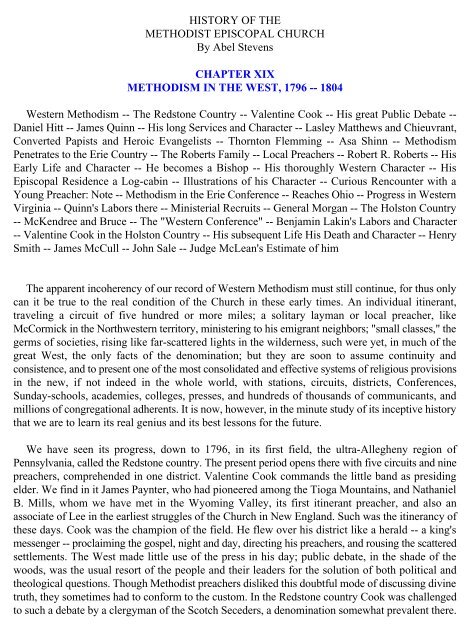History of the M.E. Church, Vol. IV - Media Sabda Org
History of the M.E. Church, Vol. IV - Media Sabda Org
History of the M.E. Church, Vol. IV - Media Sabda Org
You also want an ePaper? Increase the reach of your titles
YUMPU automatically turns print PDFs into web optimized ePapers that Google loves.
HISTORY OF THE<br />
METHODIST EPISCOPAL CHURCH<br />
By Abel Stevens<br />
CHAPTER XIX<br />
METHODISM IN THE WEST, 1796 -- 1804<br />
Western Methodism -- The Redstone Country -- Valentine Cook -- His great Public Debate --<br />
Daniel Hitt -- James Quinn -- His long Services and Character -- Lasley Mat<strong>the</strong>ws and Chieuvrant,<br />
Converted Papists and Heroic Evangelists -- Thornton Flemming -- Asa Shinn -- Methodism<br />
Penetrates to <strong>the</strong> Erie Country -- The Roberts Family -- Local Preachers -- Robert R. Roberts -- His<br />
Early Life and Character -- He becomes a Bishop -- His thoroughly Western Character -- His<br />
Episcopal Residence a Log-cabin -- Illustrations <strong>of</strong> his Character -- Curious Rencounter with a<br />
Young Preacher: Note -- Methodism in <strong>the</strong> Erie Conference -- Reaches Ohio -- Progress in Western<br />
Virginia -- Quinn's Labors <strong>the</strong>re -- Ministerial Recruits -- General Morgan -- The Holston Country<br />
-- McKendree and Bruce -- The "Western Conference" -- Benjamin Lakin's Labors and Character<br />
-- Valentine Cook in <strong>the</strong> Holston Country -- His subsequent Life His Death and Character -- Henry<br />
Smith -- James McCull -- John Sale -- Judge McLean's Estimate <strong>of</strong> him<br />
The apparent incoherency <strong>of</strong> our record <strong>of</strong> Western Methodism must still continue, for thus only<br />
can it be true to <strong>the</strong> real condition <strong>of</strong> <strong>the</strong> <strong>Church</strong> in <strong>the</strong>se early times. An individual itinerant,<br />
traveling a circuit <strong>of</strong> five hundred or more miles; a solitary layman or local preacher, like<br />
McCormick in <strong>the</strong> Northwestern territory, ministering to his emigrant neighbors; "small classes," <strong>the</strong><br />
germs <strong>of</strong> societies, rising like far-scattered lights in <strong>the</strong> wilderness, such were yet, in much <strong>of</strong> <strong>the</strong><br />
great West, <strong>the</strong> only facts <strong>of</strong> <strong>the</strong> denomination; but <strong>the</strong>y are soon to assume continuity and<br />
consistence, and to present one <strong>of</strong> <strong>the</strong> most consolidated and effective systems <strong>of</strong> religious provisions<br />
in <strong>the</strong> new, if not indeed in <strong>the</strong> whole world, with stations, circuits, districts, Conferences,<br />
Sunday-schools, academies, colleges, presses, and hundreds <strong>of</strong> thousands <strong>of</strong> communicants, and<br />
millions <strong>of</strong> congregational adherents. It is now, however, in <strong>the</strong> minute study <strong>of</strong> its inceptive history<br />
that we are to learn its real genius and its best lessons for <strong>the</strong> future.<br />
We have seen its progress, down to 1796, in its first field, <strong>the</strong> ultra-Allegheny region <strong>of</strong><br />
Pennsylvania, called <strong>the</strong> Redstone country. The present period opens <strong>the</strong>re with five circuits and nine<br />
preachers, comprehended in one district. Valentine Cook commands <strong>the</strong> little band as presiding<br />
elder. We find in it James Paynter, who had pioneered among <strong>the</strong> Tioga Mountains, and Nathaniel<br />
B. Mills, whom we have met in <strong>the</strong> Wyoming Valley, its first itinerant preacher, and also an<br />
associate <strong>of</strong> Lee in <strong>the</strong> earliest struggles <strong>of</strong> <strong>the</strong> <strong>Church</strong> in New England. Such was <strong>the</strong> itinerancy <strong>of</strong><br />
<strong>the</strong>se days. Cook was <strong>the</strong> champion <strong>of</strong> <strong>the</strong> field. He flew over his district like a herald -- a king's<br />
messenger -- proclaiming <strong>the</strong> gospel, night and day, directing his preachers, and rousing <strong>the</strong> scattered<br />
settlements. The West made little use <strong>of</strong> <strong>the</strong> press in his day; public debate, in <strong>the</strong> shade <strong>of</strong> <strong>the</strong><br />
woods, was <strong>the</strong> usual resort <strong>of</strong> <strong>the</strong> people and <strong>the</strong>ir leaders for <strong>the</strong> solution <strong>of</strong> both political and<br />
<strong>the</strong>ological questions. Though Methodist preachers disliked this doubtful mode <strong>of</strong> discussing divine<br />
truth, <strong>the</strong>y sometimes had to conform to <strong>the</strong> custom. In <strong>the</strong> Redstone country Cook was challenged<br />
to such a debate by a clergyman <strong>of</strong> <strong>the</strong> Scotch Seceders, a denomination somewhat prevalent <strong>the</strong>re.
















